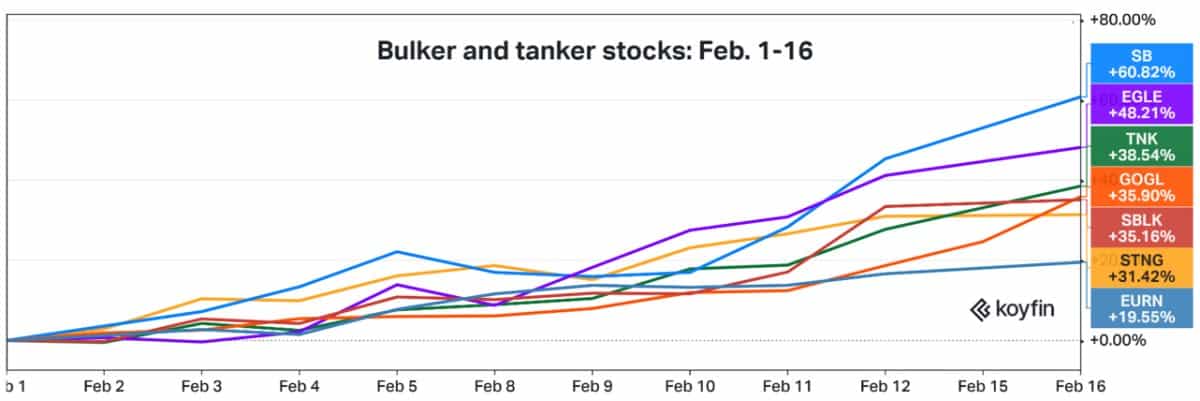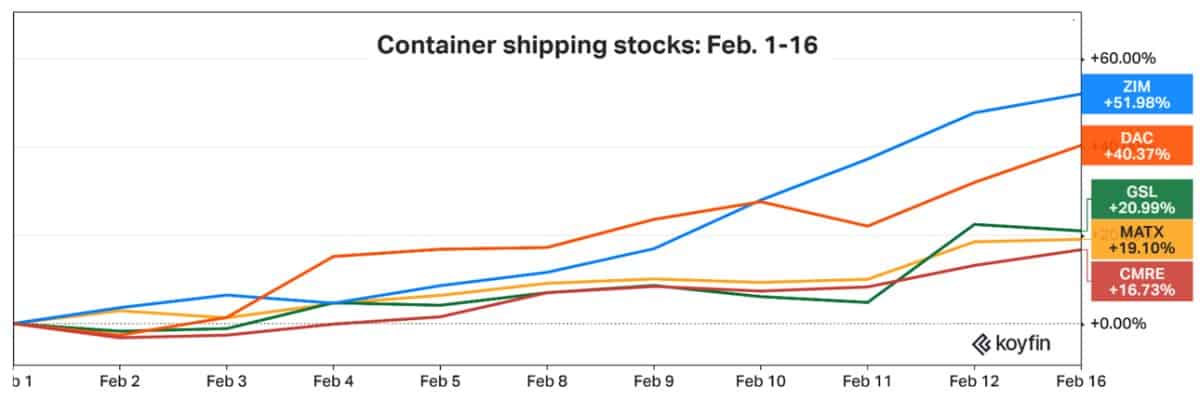Tanker spot rates are horrible. Rates for gas carriers have fallen off a cliff. Only container shipping is booming. But you wouldn’t know that by looking at ocean shipping stocks. Across every shipping sector, stocks are up double digits in February.
“Shipping stocks have been on a tear for the past several weeks,” said Clarksons Platou Securities analyst Omar Nokta during a Capital Link-sponsored virtual event on Tuesday.
“We’ve gotten used to seeing pockets [of activity] for tankers or pockets for dry bulk. But we haven’t seen this type of interest across the board in a while,” said Nokta.
Since the beginning of this month, dry bulk stocks of Safe Bulkers (NYSE: SB), Eagle Bulk (NASDAQ: EGLE), Golden Ocean (NASDAQ: GOGL) and Star Bulk (NYSE: SBLK) are up 61%, 48%, 36% and 35%, respectively.
Shares of tanker companies Teekay Tankers (NYSE: TNK), Scorpio Tankers (NYSE: STNG) and Euronav (NYSE: EURN) are up 39%, 31% and 20%, respectively. Other tanker and bulker names are also up big.

In the container liner and leasing sectors, shares of ZIM (NYSE: ZIM), Danaos (NYSE: DAC), Global Ship Lease (NYSE: GSL), Matson (NYSE: MATX) and Costamare (NYSE: CMRE) are up 52%, 40%, 21%, 19% and 17% this month, respectively.

The ‘retail horde’ theory
Why has the broader shipping-stock space revved up in February when rates for most non-container segments have not?
One theory — particularly in the wake of the GameStop (NYSE: GME) stock spike in late January — is that the “retail horde” has alighted on shipping stocks. It happened before, in April 2020, when traders on retail platform Robinhood ran up the stock of Nordic American Tankers (NYSE: NAT). If it’s happening again, this month’s price gains could be fleeting.
Evidence for this theory: Micro-cap shipping stocks favored by day traders are performing exceptionally well. Robinhood restricted trading in various stocks amid the GameStop frenzy. One of them was Castor Maritime (NASDAQ: CTRM). Castor’s shares have doubled this month.
Top Ships (NASDAQ: TOPS) was ranked the 27th-most-traded stock on the Robinhood platform in July 2020 — more popular than Starbucks, Pfizer and ExxonMobil. Top Ships’ shares are up 77% this month.
The ‘demand is back’ theory
Theory 2 is that shipping stocks are rising as investors place bets now in preparation for a global economic recovery in the second half and in 2022.
According to this thesis, there is a real demand story behind these stock moves. Yes, there are Robinhooders and Redditors about. Retail may be leading the charge. But hedge funds are also getting into the fray, and larger institutional investors are on the sidelines, ready to enter.

Nokta argued for Theory 2. “Over the past several years, the theme has been that the orderbook is low and there’s shrinking supply — and that’s always positive. But what was really missing was the demand side of the equation. What’s exciting now is that there is a resurgence of demand.
“It’s like the shipping gods asked shipowners: ‘Hey, what would you guys want?’ And shipowners said: ‘We’ll keep the orderbook low but we’d like to restart the whole demand story.’ And now, we’re seeing it playing out in the shipping markets,” maintained Nokta.
He pointed to strong rates in smaller “Handysize” bulkers carrying minor bulk cargoes — which are correlated to GDP growth — as well as the container-shipping boom and higher energy prices.
Betting on recovery
Jefferies shipping analyst Randy Giveans said during the Capital Link event, “Obviously, 2020 was pretty much ‘risk-off,’ especially for shipping. The world was ending. No one wanted economically sensitive, energy-related, global-trade-driven stocks. That is shipping to a T.

“Now, you’re starting to see a little bit of an economic recovery. People are starting to look to the back half of 2021 and to 2022. And in shipping, you can see a lot of upside [to stocks] without extensive inflows because the market caps are all relatively small.
“Shipping has always been a higher ‘beta’ sector,” he continued. (Beta is a measure of stock moves in relation to the overall market.) Giveans noted that the 31 shipping stocks covered by Jefferies are up by an average of 34% year-to-date. In contrast, the S&P 500 is up 5% year-to-date, the Russell 2000 15%.
Jon Chappell, transportation analyst at Evercore ISI, pointed to nonshipping drivers behind the recent jump in shipping stocks. “When you look at the broader market — the reflation trade, commodity strength, small caps, energy, highly shorted stocks, out-of-favor names, a play on the recovery — shipping checks a lot of those boxes, whether in the second half of this year or in 2020.”
Getting institutional investors back on board
Chappell believes recent stock moves “certainly seem to be more retail-driven” than institutional investor-driven.
He said that a true recovery in interest among larger institutional investors will require proof of a sustainable recovery — which remains hypothetical, particularly for tankers. “The tanker market is the worst I’ve ever seen,” said Chappell.

“Cyclical spikes in shipping tend to be more short-lived. No investor wants to be left holding the bag when you hit an inflection point.
“In 2004-08, the shipping industry got the benefit of the doubt whenever there was a downturn. People were always anticipating the next resurgence. But since the global financial crisis, this has been an industry where you have to prove the sustainability of the cycle. We may have a strong fundamental outlook now, but I think it’s going to be a slow grind in proving that this can be a sustainable upturn as opposed to just another winter spike or another floating-storage spike or another sanctions-driven spike,” said Chappell.
“Is it really different this time? When you have a multiyear upturn in the market, then you will get broader investor appeal and you will start to see a revaluation of these stocks. And I would argue that we have not had a sustainable cycle [recovery] in any segment of shipping since before the financial crisis.”
Nokta: This time it’s different
According to Nokta, “It seems like for tankers, it has always been something very exciting but very short-term-oriented. Spot rates spike and the day traders come in and trade the names. We saw record volume last April in this sector but it was just volume. We didn’t get people parking in these names. They just traded them back and forth.
“But to us, it feels quite different this time,” he affirmed.
Giveans noted that recent years’ investor interest “was always sector-specific. It was tankers last April and containers in September and dry bulk in June. Now, in terms of investor appetite and interest, it’s picking up across the board.”
Nokta said, “I’ve gotten much busier on the phone, not only talking to hedge funds, which is typically the primary investor base in shipping, but also with more long-only funds. It’s not flying off the rails, but there are more discussions. There is more interest. People are sharpening their pencils. There is definitely a much bigger audience waiting in the wings.” Click for more FreightWaves/American Shipper articles by Greg Miller
MORE ON SHIPPING STOCKS: Shipping’s Wall Street saga: rags to riches to rags to occasional riches: see story here. Container rates are on fire. How can you invest in that? See story here. Shipowners with shares worth pennies rake in millions: see story here.







